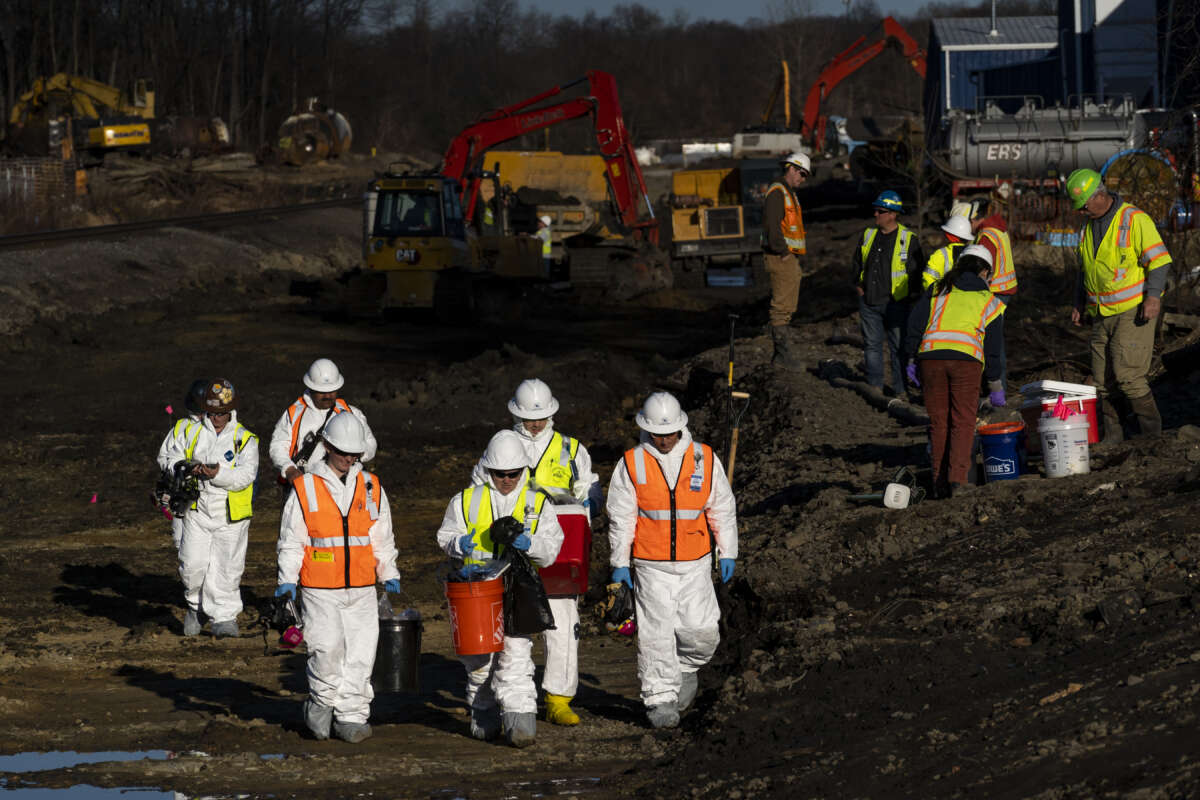Honest, paywall-free news is rare. Please support our boldly independent journalism with a donation of any size.
This story was originally published by Grist. Sign up for Grist’s weekly newsletter here.
It’s been a bit more than two months since a train derailment in rural Ohio spilled 38 cars’ worth of hazardous materials, including a highly toxic petrochemical called vinyl chloride, in East Palestine. In the weeks following the disaster, it seems to many residents the problems just keep piling up.
Their patience was strained again Monday when a truck hauling 40,000 pounds of contaminated soil from the accident site overturned on Interstate 65 in Columbiana County, Ohio. The truck was bound for a disposal facility in Texas, and about half of the dirt spilled into the road and onto the land of a local resident. Officials say they’ve contained the mess and it poses no threat to nearby waterways. But people who’ve lived in the shadow of the catastrophe say it’s just another in a long list of grievances, and it underlines the ongoing crisis in East Palestine.
“People are wanting to fight, but folks are getting beat down,” said Amanda Kiger.
Kiger leads River Valley Organizing, a grassroots environmental organization based in East Palestine. She lives in East Liverpool, about 7 miles away from Monday’s accident. Since the spill, River Valley Organizing has drawn up demands, which include relocation for anyone who wants it, independent environmental testing, and ongoing medical testing and monitoring. It also wants Norfolk Southern, which operated the train that derailed, to pay 100% of those costs. Many of them have yet to be met, and toxic waste remains a particular concern.
Kiger says the disposal process has been almost impossibly convoluted. Originally, the soil and other waste was to be trucked to appropriate facilities in other states. But facilities in Michigan, Ohio, Indiana and Texas all rejected it. One recent iteration of the plan, approved by the Environmental Protection Agency, called for sending it to Heritage Thermal Services, an incinerator about 17 miles away in East Liverpool. Kiger says the community strongly opposes that idea. The facility has been fined and sued for environmental violations several times over the past 20 years, including one instance in which officials determined 195 cases of excessive emissions between 2010 and 2014.
According to EPA officials, Norfolk Southern is responsible for identifying a disposal facility, and any under consideration must meet state and federal safety guidelines. “The facility is regularly inspected by federal and state officials for compliance, and is required under its permit to monitor its operations and ensure all waste is properly destroyed,” said an EPA representative. “That monitoring has been occurring, and continues to occur.”
River Valley Organizing favors incineration in general, but wants the material trucked to a state-of the art facility in Arkansas. “It’s hard to get rid of, and we understand that,” Kiger said. “But what is going on is nobody wants to take the dirt.”
The truth of it is that a toxic mess like the one in East Palestine often creates more messes that are hard to clean up. Earlier reporting from NPR found that residents fear their town may join a long line of contaminated sites awaiting full cleanup by the EPA, many of which have sat unfinished for decades.
“We see there’s human and mechanical error, no matter how we transport this,” Kiger said. “What is the way there’s going to be the chance of the least impact of a disaster does come about?” To Kiger, despite the accident, trucking is still probably the safest means of transport because moving the dirt by barge could contaminate the river, and a train could derail.
And all the while, Kiger says, piles of toxic soil sit on a public street, covered by a tarp, stirring back into the air when the wind blows. She also adds that the whole area is in a floodplain of the Ohio River Valley, which tends to see a good deal of spring rains.
Ultimately, Kiger says, these incidents are frightening in part because many feel they simply don’t have access to accurate information, can’t trust what they’re getting, hear official statements that contradict what they can see and hear and smell and feel. Kiger says that two months on from the disaster, residents are feeling discouraged and confused. “Folks are just getting this word soup tornado sent at them,” she said. “You can tell there’s words in there, but they’re all covered with dirt and you really don’t know what they mean.”
Media that fights fascism
Truthout is funded almost entirely by readers — that’s why we can speak truth to power and cut against the mainstream narrative. But independent journalists at Truthout face mounting political repression under Trump.
We rely on your support to survive McCarthyist censorship. Please make a tax-deductible one-time or monthly donation.
